
Picks: Welcoming First Time Gamers to the Table
Drew Dixon || @_DrewDixon
Board games are marvelous inventions that make the world a better, happier, healthier place. When we play games around a table we’re exercising our brains, solving problems, reducing stress, increasing self-confidence, and, most importantly, spending focused time with people who matter to us. Through board games we can deepen our relationships with friends and loved ones.
I have only met a handful of people who genuinely do not like board games. One of them can’t sit still long enough to listen to the rules, but the others just had a bad first experience. They were roped into playing a game they didn’t really want to play, too tired to comprehend the rules, or found themselves frustrated because the person teaching failed to adequately explain the game. I am convinced that most people who claim they don't like board games just haven’t found the right game or the right gaming experience.
Here are five simple strategies to welcome first time gamers to the table in a way that provides you both with a meaningful experience:
Start small.
Deep, complex, highly strategic games might be your jam. They can be daunting and alienate new players though. In fact, if your choice of game is making another player feel overwhelmed, there is a good chance they won’t be keen to play again. The more complicated the game, the more likely it is to make other players feel like outsiders. Consider starting with a game whose rules can be explained in five minutes or less and work up from there. Word games like Trap Words and Codenames and dexterity games like Tokyo Highway are great places to start. And if you want something slightly more strategic but easy to explain, I highly recommend Space Park.

Create the right vibe.
A good rule of thumb is cookies first, board games second. Actually the order doesn’t matter, you might find it worthwhile to bring a treat out mid-game. The point is making a little bit of effort to cater to your guests goes a long way to creating an experience that you’ll both enjoy. Providing a favorite snack or drink will make your guests feel welcome and cared for. My wife and I have lots of friends with dietary restrictions, so we typically make a vegan brownies or cookie cake, both of which go a long way toward making game nights memorable and welcoming.
Set expectations (yours and theirs).
If the box says the game plays in an hour, remember that it will take longer if you are teaching it to new players. Try to get a sense of how long your guests plan to stay and choose a game that you're confident works well in that timeframe. Respect their boundaries in terms of how many games you play and for how long.
Know the game like the back of your hand.
Unless you are an expert multitasker, it is unlikely that you’ll be able to give your guests the attention they deserve while reading a rulebook. Prior to hosting new players, make sure you know the rules really well so that you are prepared to clearly and concisely explain them. It can also be helpful to ask your guests questions to try and better understand how they learn. Do they want to know all the rules before starting or just the basics and ask questions as they go? Are they visual learners? Would it be helpful if you went first so they could observe? If you are like me, reading rulebooks puts you to sleep but seeing a game played is engaging and helpful. Thankfully, there are lots of great videos on YouTube that can help you learn games quickly and concisely and you can watch other people play the game you are about to teach so you can get a sense of how rounds play out.
Hone in the observation skills.
Keen-eyed hosts can generally pick up on whether guests are having a good time. Sometimes it's obvious because they keep asking, “How much longer will this game take?” Other times, it gets trickier. If you are on turn 4 and your guests are still asking the same questions about the rules or talking about anything and everything but the game, chances are they just aren’t into the game you’re playing. Try to keep your expectations low and don’t be afraid to pivot to a different game or activity if enough people are not feeling it.
Big picture. These tips are not hinting that you should recycle your fresh new copy of Twilight Imperium (which takes the cake for game length). Rather I hope they help pave the way for great game experiences. Meaningful game experiences, like meaningful relationships, are mutual. When you make an effort to provide a welcoming first time game experience for your friends or loved ones, you’ll find your own enjoyment increasing as well. Give these a try and I bet you’ll be creating an environment where friends feel welcome and memories are created around the table.
